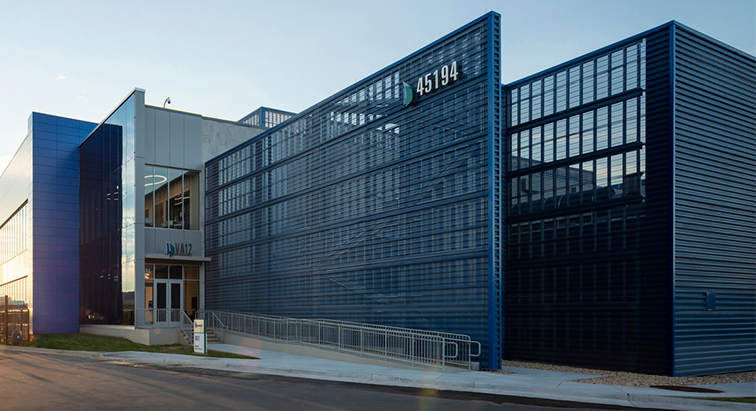Organizations rely on these intelligently designed spaces to hold their most critical and private information and keep their network systems up and running, so business as usual can prevail. With such importance comes the need for creative thinking and problem solving throughout the data center design and construction process for optimal security, protection, and uptime.
The Advantages of Precast for a Data Center Building
Since data center buildings are so vital, the structures require unique specifications to be considered suitable for all intended purposes: housing the hardware and essential data that keep business-critical information and processes safe, secure, and operational. While the data remains secure with firewalls, encryption, and so on, the physical space needs to be robust and heavily insulated. In fact, the most securely built data centers can withstand natural disasters such as extreme weather or seismic activity that could either disrupt or destroy data center systems. This is where precast comes in.
Precast concrete is a durable, high quality, aesthetically appealing, and easily moldable material, making it a smart choice for most projects including data centers, where its advantages over steel or cast-in-place (CIP) concrete are uniquely pertinent.2 Precast meets the multi-faceted needs and integrity of data center construction projects in many ways:
- Quality & Speed: Factory-fabricated precast panels are manufactured in a controlled environment off site with rigorous quality control procedures. Precast panels are made in advance and brought to the job site as soon as erection is feasible. Faster erection equals a shorter construction schedule and therefore reduced overhead costs.
- Flexibility of Space Planning: Precast concrete construction can deliver longer spans, creating more design flexibility and larger open floor plans, beams, roofs, and so on.
- Integrated Project Delivery: Structural precast components interlock to support one another so they can be quickly erected. Simpler installation requires fewer crew members, which means less traffic and waste on a job site. Construction consists of delivering the precast parts to the job site, erecting the building within a short amount of time, and cleaning up afterward. Fewer people and moving parts equate to a safer and cleaner job site, which helps ensure work flows smoothly and is finished on time.2
- Strength & Resilience: The renowned strength of precast concrete offers unparalleled resistance to fires, extreme weather, natural disasters, and man-made impedance.2
- Energy Efficiency: Data center buildings require significant HVAC capacity to ventilate the heat generated by stacks upon stacks of network equipment, as these intricate systems use massive amounts of energy every day. Using precast wall panels with continuous insulation can provide R-values of R-20 or more depending on insulation thickness. Costs associated with heating and cooling can be significantly reduced through concrete’s inherent insulating properties and timely reaction to changes in outside temperature.
- Sustainability: Precast concrete is a sustainable building material choice, making this option more appealing for modern-day developers in data center construction. Precast is made of natural aggregates such as gravel, sand, rock, and water, which can be easily and locally sourced. These materials reduce waste as less raw material needs to be harvested from the environment and disposed of at the end of a building’s lifecycle.
Why Precast for Data Center Design & Construction
The unmatched versatility of precast concrete construction, paired with cost-effective benefits, makes it an easy choice when planning data center construction, as precast is poured to match the exact high-performance qualities and specifications needed. Depending on the level of security required throughout the building, precast panels can be efficiently designed and poured to include or not include windows, doors, and temperature control systems. Not only does precast achieve structural versatility needs, but it can also match or meet various style and design requests, even amidst existing buildings. The benefits of precast concrete for data center design and construction are unmatched.
Are you interested in a total precast solution for your next data center building? Browse our Solutions Center to get quick answers to your technical or budget questions.





